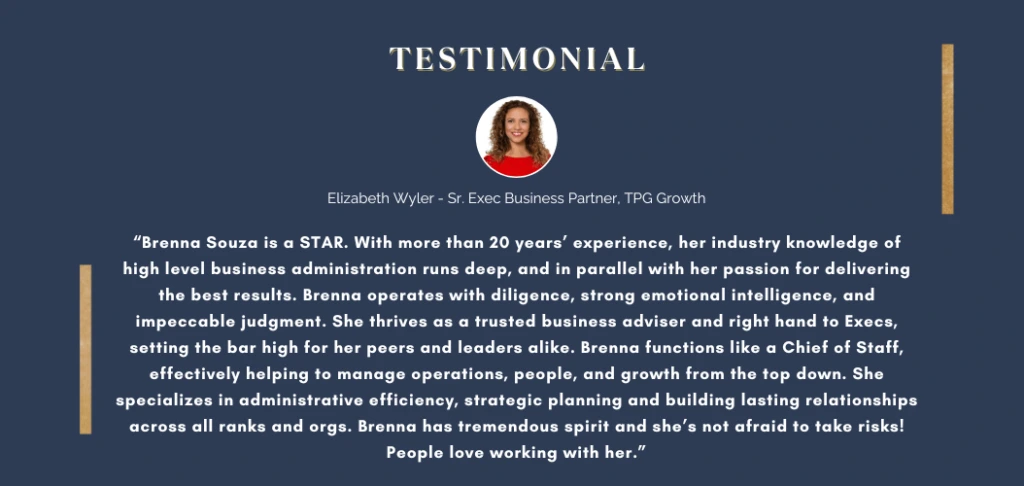
Executive assistant careers have undergone a significant evolution since the era of typing pools. Especially with the explosion of the startup ecosystem that kicked off in Silicon Valley all those years ago. This role now encompasses a wide variety of paths and opportunities.
In this discussion, I’ll focus on the two types of executive assistant positions I’ve held personally and highlight two key behaviors instrumental in rapidly expanding my level of responsibility and compensation.

Generally speaking, there are a few core job duties inherent to all executive assistant roles. By and large, these include scheduling, travel, and expenses.
Some roles stay in that zone, more or less, with the exception of some project work.
Others fall into the chief of staff or business partner bucket and consist of a myriad of other responsibilities. Some examples would be project management, supervising a team, offsite planning, agenda creation, and operating as a proxy for your executive. To name a few.
It really depends on the industry, company size, and who you support.
I’ve held both types of roles.
Throughout high school and college I worked as a traditional administrative assistant, mostly for small businesses and legal firms. Primarily focusing on scheduling, transcription, editing, and general secretarial duties.
Later in my career, I moved to San Francisco and supported executives in banking, commercial real estate, and government contract services. I eventually ended up in the startup space, which was my favorite. As you might expect, these positions were more senior, carrying a much higher level of responsibility than the earlier roles.
As an aside, I personally feel the startup space offers far more opportunities to grow your executive assistant career than most other industries. But that’s a topic for another day.
Out of the two paths I experienced, I preferred the business partner/chief of staff bucket the most. It allowed me to take on significantly more responsibility and make a larger impact wherever I worked. Oh, and more money.
That said, both are great career paths. It just depends on your personal preferences and lifestyle.
There were two things I did or rather did not do consistently that allowed me to excel in both types of roles.
Here they are. Drumroll please…
Stop waiting for direction. And. Stop asking for permission.
Seriously, stop. Just do.
If you have the knowledge, skills, ability, and desire to fix something, fix it. Take the lead and get er’ done. Regardless of whether or not it’s part of your core duties. If you see a problem that falls under your executive’s purview, consider there may be an opportunity for you to make an impact.
You possess a unique set of skills and abilities that can truly transform their workflow, the department, and your career. It’s time to unleash your full potential and demonstrate your true value to your executive(s).
Let’s face it, they have no idea what you do or how you do it. They are focused on their own responsibilities and rely on you to “GSD.” They don’t fully grasp the extent of your capabilities or the skills you’re tapping into to manage their life.
But here’s the exciting part – you have the power to change that.
They aren’t mind readers and unless you show them where you can add value, your talents remain a secret. Therefore, it’s up to you to reveal the full spectrum of your abilities. By doing so, you’re not just enhancing your own career prospects – you’re adding immense value to the organization.
Don’t keep your valuable skills hidden because you’re afraid to take control.
If you want to be trusted with more information, responsibility, and project work – find a way to create opportunities for yourself.
In short, initiative is the key to unlocking new opportunities and higher salaries.

During my executive assistant career, I always viewed my job through the lens of partnership and helpfulness. I poured my heart and soul into my role. Never viewing myself as an assistant; but as a trusted confidant and go-to person!
My goal was to be a support system and make their lives easier, adopting their agenda as my own. I was fully invested and believed working as a team would further their goals.
Instead of asking them, ask yourself.
Where can I add more value? What can I take off their plate?
What communication string or project can I bring to completion?
Where are the gaps within the department they manage that I can step in and fill?
If you have delegate access to your executive’s email, you have an even greater opportunity here because you see all of the issues they manage.
Waiting for instructions or assignments often leads to missed opportunities and underutilization of your talents. Don’t settle for tasks that barely scratch the surface of your true potential.
Now, if you’re supporting an executive who’s worked with many senior EA’s, that’s different. They’ll likely have a list of responsibilities and projects ready for you to manage. But if that is not the case, consider promoting yourself first and actively seek ways to expand the scope of your role.
You’re in a unique position, privy to information that most employees are not. You witness daily operations, see gaps, and understand the pain points better than others. This knowledge is power. Leverage it.
Don’t wait for someone to hand you responsibilities. Seize them. Show initiative by picking up those dropped balls and knocking them out of the park.
Your potential is limitless – but it’s up to you to prove it.
I’ve never taken initiative and brought about a solution or created positive change and later been “scolded” for not asking permission first.
That’s not true. I organized a surprise birthday lunch for an executive once. Turned out he hated celebrating his birthday. He scolded me. Oops, my bad. Who knew?
Anyway, I’ve always been thanked. And simultaneously earned more respect. Sometimes I would even get the beloved “how did you do that?!” response.
Hehe…I have my ways…
The truth is assistants are the backbone of the executive’s office, the miracle workers that pull solutions out of their back pocket. Often averting crises before anyone senses trouble.
Own that. Be confident, take charge, and lead from your position. You don’t need a fancy title to be a leader. Leadership is an energy anyone can embody, regardless of their role or title within an organization.
Of course, maintain professionalism and respect for your colleagues, but don’t shy away from the numerous opportunities within the daily operations where you can make a real difference.
Think about it: if you’ve improved a process or added significant value, your boss isn’t likely to reprimand you. On the contrary, you’ll likely gain more influence and respect in your executive’s eyes.
This is your pathway to greater responsibility, career advancement, and yes, a healthier paycheck.
Seize the opportunities. Your future self will thank you for it.

If you’re not sure where to start, here’s an example I’ve given some of the junior EAs I’ve coached over the years. Many EAs already do this, but if you’re struggling with confidence or are early in your executive assistant career, this is a good place to focus your efforts.
Start with status updates.
This can be as simple as a draft presentation making the rounds for an upcoming meeting: BOD, All Hands, Leadership, etc. Perhaps your executive is waiting on information from another department head or employee before he or she can complete the presentation.
As their executive assistant, you know their deadlines. You also know they don’t have time to follow up constantly. Given that, step in and handle the follow-up on their behalf. Start lighting a fire under whoever is holding up the works. Professionally.
Reach out to whomever is the current bottleneck, or better yet go to their desk and have a casual chat.
Don’t stand over them. Sit down or crouch down so you’re at eye level. Standing over people can make some feel loomed over like they’re being scolded. I learned that the hard way. Build rapport, be respectful, and ask them if they have any updates on their end of the presentation. The delay on their part might be something you can help them with.
Alternatively, if procrastination is the issue, following up will surely light a fire under them to get it done. Don’t worry about rubbing them the wrong way. Trust me, they’ll prefer your gentle nudge far more than the boss firing off a curt email asking what the hold up is.
Some of the EA’s I’ve coached ask “what if it’s another executive holding things up?”
To which my response is “so what?” Okay, if that executive has an assistant, start there. Sometimes I would do that, sometimes not. It depended on the situation. But if they don’t or their assistant is non-responsive or unavailable, take the lead.
An executive or department head is not a mythical unicorn, they’re just a regular person with a lot on their plate. If you’re nervous about approaching them, catch them when they’re grabbing a snack or coffee. Obviously you need to judge your own circumstances. If you work at a massive fortune 500 company, don’t hunt down a high level executive in their 30th floor office. Defer to their EA.
But if we’re talking about someone who reports to your boss or if you work at a startup, small or mid-level business, university, etc, working and communicating directly with executives shouldn’t scare you.
In truth, everyone puts their pants on one leg at a time. In the realm of humanity, we are all equal. Somebody having a fancier title and larger paycheck than you doesn’t make them better or superior. Own your worth and walk with confidence.
Just be decent, show some respect, and come at it like you’re genuinely trying to help. You’re just doing your job and representing your boss. They’ll get it. Most of them won’t give you any grief, and if they do? Then “Houston, we have an ego problem.” That’s on them, it has nothing to do with you, let it go.
But again, they will likely prefer your nudge to the boss’ eventual public shaming.
Going from there, the opportunities to step in and step up are endless. Provided any additional work you take on doesn’t steal your focus from your core duties, you are more likely to encounter support rather than resistance.
By assuming a more proactive role, you’re simultaneously building a stronger internal network and expanding your knowledge.
It’s important to realize the significant benefits of building rapport with colleagues through face-to-face interaction. It establishes mutual respect, enhances efficiency, and builds social capital. As a result, those connections can be leveraged down the line to achieve goals more effectively.
Unfortunately, the prevalence of tools such as Slack and G-chat has led to a shift in workplace interactions. But relationship building is a crucial skill to master, especially as an executive assistant. I was able to move mountains in my executive assistant career on relationship building alone. Whenever I had requests or needed help of any kind, people always obliged.
Remember, you are working on behalf of the boss. Use that to your advantage to effect positive change in the company, which reflects positively on your boss. As a result, this raises your cachet and respect within the organization.
When you approach another employee respectfully but confidently, they are more likely to stop what they’re doing to communicate or work with you because of your role.
The most effective way to grow your career is to stop waiting to be noticed and start making yourself known. After all, it’s always better to ask for forgiveness, not permission.
Demonstrate your true potential, showcase your skills, and prove you’re a game-changer. Your executive’s respect and trust will skyrocket, ultimately leading to more responsibility and opportunity.
The point is…



Brenna is a former Silicon Valley operations leader turned startup whisperer, using her own battle scars and tales of victory to guide others through the land of unicorns and disruptors.